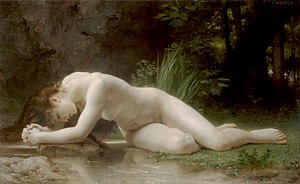Brother complex

Brother complex (Japanese: ブラザーコンプレックス)[2] refers to a state of strong attachment and obsession to brothers. It is also commonly abbreviated as "brocon" (ブラコン),[3][4] and in this case, it is also used for brothers and sisters who have a strong attachment and obsession to brothers.
History
In 1917, Yoshihide Kubo stated in his work Psychoanalysis that Ophelia and Laertes had a "brother-sister complex" relationship.[5] In his 1932 work Psychological Analysis, Kubo called the relationship between father and daughter by sexual instinct "father–daughter complex" and that between mother and son "mother-son complex". He argues that "brother-sister complex" is a transfer of "father-daughter complex" and "mother-son complex".[6]
The word brother complex is used in the manga work Laughing Clown, which depicts brother and sister who aim to become violinists, which is included in Akemi Matsuzaki's book Labyrinthine Castle released in 1988.[7]
Overview
The term "brother complex" was originally a slang term for fetishism, but it was generalized by this term because fetishism and complex were related concepts in analytical psychology. When the other party is a sister, it is called a "sister complex".
In general, the brother complex is described as a sister who has "love feelings toward her brother" and "exclusive desire to own."[8][9] For a woman with a brother complex, brothers, combined with sexual aspirations, can become an idealized image and have more influence on her life than her parents. For example, choosing a lover or spouse who has something in common or similar to her brothers.[10] It may be accompanied by a negative image, and it may be seen as "making the brothers accept her selfishness to the maximum" or "treating the brothers freely and conveniently". On the other hand, the strong bond between male brothers is often seen positively as a symbol of masculinity.
According to psychiatrist Takashi Okada, women in the brother complex can become depressed or unstable when their brother has a lover or when they get married. Also, in such a case, she may feel jealous of her brother's partner, or may idealize her brother's partner as an entity that has acquired the love of her brother that she could not obtain. The more attached such a woman is to her brother, the more distance she is from her brother's home to balance her mind.[11]
According to a research conducted by Mynavi Corporation on women with siblings by September 2019, more than 20% of women identified themselves as a brother complex.[12]
Cause
It is speculated that the cause of the excessive brother complex is due to parents' problems and social anxiety. Interpretations related to the child psychologist Jean Piaget speculate that the older sister may be trying to resolve her dissatisfaction with her decentralization due to her younger brother's birth by controlling her younger brother.
Moe term
Since the 2000s, the term brother complex is sometimes used as a moe term in video games (especially eroge), anime, and light novels. In Chinese, it is called "兄控".[13] As a concrete example of works dealing with brocon (or a person with that temperament appears), there is Gekka no Ichigun,[14] Sister Princess,[15] Oreimo,[16] OniAi, I Don't Like You at All, Big Brother!!,[17] My Girlfriend is Shobitch, Hensuki, My Sister, My Writer,[18] World Break: Aria of Curse for a Holy Swordsman.[19] Minako Saito states that Sayla Mass is more of a brother complex to Char Aznable.[20] Takako Shimura's Beautiful Everyday features a girl from the brother complex.[21] Anime News Network's Theron Martin states that Suguha Kirigaya's unrequited love for Kirito in Sword Art Online seems to be intended to pander to fans of the "Big Brother Complex".[22]
By August 12, 2012, Flex Comix had opened a special page on its official website for the comic anthology Brocon Anthology Liqueur, which is based on the brother complex.[23]
See also
References
- ^ Takeshi Harada (2001). インセスト幻想 人類最後のタブー. Jimbunshoin. p. 171. ISBN 9784409240656.
- ^ "ブラザーコンプレックスとは". Daijisen. Kotobank. The Asahi Shimbun. Retrieved January 24, 2021.
- ^ Akihiko Yonekawa, ed. (2003). 日本俗語大辞典. Tokyodo Shuppan. p. 560. ISBN 9784490106381.
- ^ "My Sister, My Writer - The Fall 2018 Anime Preview Guide". Anime News Network. October 10, 2018. Retrieved January 25, 2021.
- ^ Yoshihide, Kubo (1917). 精神分析法. 心理学研究會出版部. p. 241.
- ^ Yoshihide, Kubo (1932). 精神分析学. 中文館書店. p. 225.
- ^ Akemi Matsuzaki (1988). 迷宮城. ハロウィン少女コミック館. Asahi Sonorama. p. 243. ISBN 9784257980803.
- ^ 用例でわかる カタカナ新語辞典 第3版, Gakken, July 2011, p.563 ISBN 978-4053032645
- ^ Masao Yokota (2016). 教養のトリセツ 心理学. Nihon Bungeisha. p. 123. ISBN 9784537261448.
- ^ Takashi Okada (2015). きょうだいコンプレックス. Gentosha. pp. 173–174. ISBN 9784344983915.
- ^ Takashi Okada (2015). きょうだいコンプレックス. Gentosha. p. 175. ISBN 9784344983915.
- ^ Noriko Takesue (August 15, 2019). "ブラコンは恋愛面で不利? 実録・みんなが遭遇したブラコン女子". Mynavi. Retrieved January 24, 2021.
- ^ "《少女歷史》|日本少女常講的「可愛」 是出於能包容醜陋的母性". HK01. January 7, 2021. Retrieved January 24, 2021.
- ^ Shinbo Nobunaga (2008). 現代マンガの冒険者たち. NTT Publishing. p. 377. ISBN 9784757141773.
- ^ Tohru Honda (2005). 萌える男. Chikuma Shobō. p. 182. ISBN 9784480062710.
- ^ アニメ『俺の妹。』がこんなに丸裸なわけがない。. Kadokawa Future Publishing. 2014. p. 103. ISBN 9784048664509.
- ^ Jonathan Clements; Helen McCarthy (2015). The Anime Encyclopedia, 3rd Revised Edition: A Century of Japanese Animation. Stone Bridge Press.
- ^ "What the Hell is Happening in My Sister, My Writer? - This Week in Anime". Anime News Network. November 27, 2018. Retrieved January 24, 2021.
- ^ "World Break: Aria of Curse for a Holy Swordsman – The Winter 2015 Anime Preview Guide". Anime News Network. January 11, 2015. Retrieved January 24, 2021.
- ^ Minako Saito (1998). 紅一点論 アニメ・特撮・伝記のヒロイン像. ビレッジセンター. pp. 156–157. ISBN 9784894361133.
- ^ Hodgkins, Crystalyn (January 1, 2021). "Takako Shimura Ends Beautiful Everyday Manga on February 8". Anime News Network. Retrieved January 21, 2021.
- ^ Theron, Martin (December 28, 2012). "Sword Art Online episodes 15–25 – Review". Anime News Network. Retrieved January 25, 2021.
- ^ "ブラコンアンソロ2は草野紅壱表紙、執筆陣に位置原光Zら". Natalie. August 12, 2012. Retrieved January 3, 2021.
